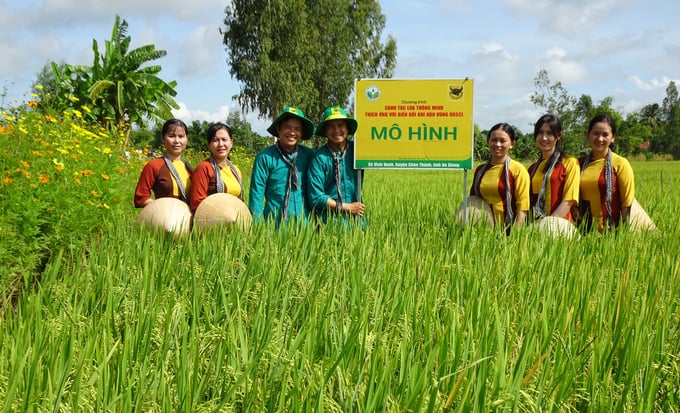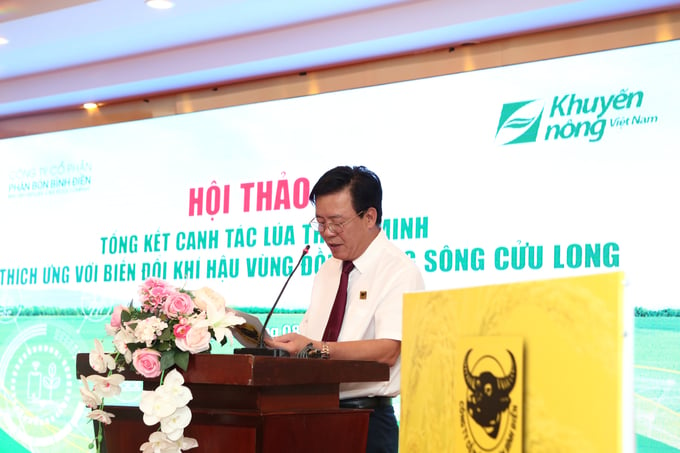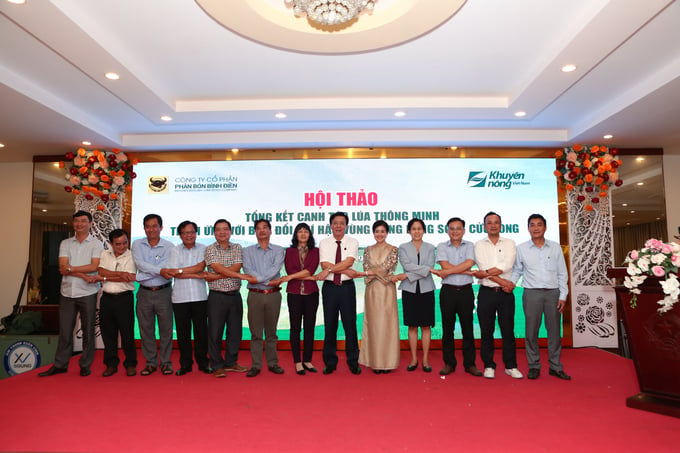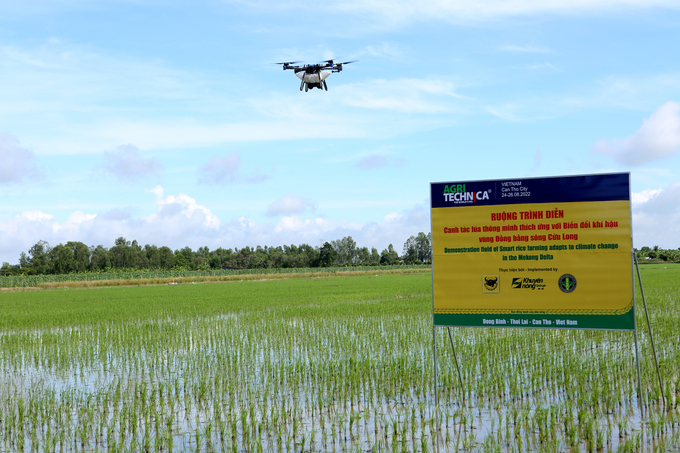May 22, 2025 | 03:22 GMT +7
May 22, 2025 | 03:22 GMT +7
Hotline: 0913.378.918
May 22, 2025 | 03:22 GMT +7
Hotline: 0913.378.918

The "Smart climate change adaptable rice farming" model is implemented by Binh Dien Fertilizer Joint Stock Company in collaboration with the National Agricultural Extension Center. The model is implemented in thirteen provinces and cities across the Mekong Delta.
Binh Dien Fertilizer Joint Stock Company, a business operating in the field of fertilizer production, has actively participated and contributed to the implementation of environmentally friendly rice farming practices.
Impacts of rice farming on the environment
Vietnam's agricultural sector been the resilient backbone of its economy throughout history, especially during epidemics and global crises. The agricultural sector brings the country nearly 40 billion USD in revenue every year. Additionally, the production and export of rice plays an important role in ensuring food security and creating livelihoods for over 70% of Vietnam’s population.
However, in addition to its achievements and contributions to society, rice production is facing numerous challenges in terms of greenhouse gas emissions, which adversely affect the environment.
According to the biennial update report to the United Nations Framework Convention on Climate Change made by the Ministry of Natural Resources and Environment of Vietnam in 2014, 33% of greenhouse gas emissions originate from the agricultural sector; 50% of which are from rice farming (source: AgResults Vietnam Emissions Reduction Project Document).
Scientists believe that most agricultural production processes produces greenhouse gas emissions such as CH4, N2O and CO2. They are one of the main factors causing global climate change.
The decomposition of organic matter in the soil produces a significant amount of CH4, a greenhouse gas that is approximately 25 times more effective than CO2 at trapping heat. The unbalanced and uncontrolled use of chemical fertilizers produces N2O and CH4 (N2O is a greenhouse gas that is approximately 300 times stronger than CO2. The burning of post-harvest weeds and straw produces CO2 and N2O, both of which increase the amount of greenhouse gases in the air.
Ineffective soil management and sowing processes cause greenhouse gas emissions by weakening the soil’s ability to absorb CO2. Furthermore, inefficient irrigation and water management also lead to the production of CH4 gas.

Mr. Ngo Van Dong - General Director of Binh Dien Fertilizer Joint Stock Company.
Due to increasing challenges from climate change and pressure for sustainable growth, the agricultural sector is looking for innovative solutions to reduce greenhouse gas emissions and promote green growth. Smart farming in combination with the use of advanced technology is becoming a promising option towards the development of green and sustainable agriculture. It is necessary to encourage the participation of the entire agricultural system, scientists, businesses and farmers in this endeavour.
"Smart climate change adaptable rice farming" is a familiar concept to farmers in the Mekong Delta because a similarly-titled program has been implemented by Binh Dien Fertilizer Joint Stock Company in coordination with the National Agricultural Extension Center. The program has been deployed in thirteen provinces and cities across the Mekong Delta for several years. "Smart rice farming" was designed by Binh Dien in order to help farmers effectively use natural resources.
The program offers consultations on the amount of seeds to sow, the schedule and method of irrigation, instructions on appropriate fertilizer use, smart fertilizers, optimal pest and disease management, etc. As a result, the program has reduced the overall amount of seeds, fertilizer, irrigation water, pesticides and labor in rice farming.
On the other hand, the program offers new technical solutions that combine the application of advanced equipment, technology and digital technology to help farmers improve farming efficiency, reduce greenhouse gas emissions during production. These factors greatly contribute to reducing environmental pollution in addition to developing a green and sustainable agriculture.
Assoc. Prof. Dr. Nguyen Van Bo, former Director of the Vietnam Academy of Agricultural Sciences, commented: “Binh Dien Fertilizer Joint Stock Company is a major fertilizer manufacturing business in Vietnam. The majority of fertilizer businesses specializes in providing materials and fertilizers. However, Binh Dien Fertilizer Joint Stock Company also provides solutions and smart farming, including using smart fertilizer as a viable solution.
We recently concluded the Smart Rice Farming program in the Mekong Delta in thirteen provinces and cities. The program was implemented between 2016 and 2022. We have found the program to be a suitable approach, both domestically and internationally."

Mr. Ngo Van Dong - General Director of Binh Dien Fertilizer Joint Stock Company (sixth from the right) with Heads of the National Agricultural Extension Center and local Agricultural Extension Centers at the Closing Workshop for the Smart climate change adaptable rice farming program in the Mekong Delta in 2022.
The Smart climate change adaptable rice farming program was implemented by Binh Dien in thirteen provinces and cities across the Mekong Delta. Accordingly, the two-phase program was implemented on seven rice from 2016 to 2017 and from 2020 to 2022. The program yielded relatively positive results, including reducing sown varieties from over 200 kilograms to under 80 kilograms per hectare; reducing fertilizers and pesticides by over 1.5 million VND per hectare; increasing rice yield by over 400 kilograms per hectare; increasing profit by 4 to 4.5 million VND per hectare compared to the control.
The integrated farming process in the Smart climate change adaptable rice farming program has been recognized by the Department of Crop Production as a technical progress.
In addition to advanced farming solutions, smart fertilizer products such as microbiological fertilizers, slow-dissolving fertilizers, fertilizers containing substances that inhibit or promote nutritional factors, Binh Dien has applied several auxiliary equipment and digital technology in order to improve the program's effectiveness and meet green growth goals.
For example, the program has installed automatic saline and pH level monitoring stations on coastal rivers and canals in the Mekong Delta region; installed automatic pest monitoring stations; provided farmers and technicians with salinity and pH measuring instruments, seed sprayer for rice sowing and fertilization; applied field monitoring software; developed a smart farming application to provide technical advice; supported farmers, integrated farming diary features; established future production unit codes and so on.
In addition to the Smart rice farming program in the Mekong Delta, Binh Dien Fertilizer Joint Stock Company participated in the "AgResults sustainable rice production and reduction of greenhouse gas emissions" project owned by SNV. The project was implemented from May 2017 to March 2021 in Thai Binh province, a region known for its long-standing tradition of wet rice production in the Red River Delta.
The "AgResults sustainable rice production and reduction of greenhouse gas emissions" project was designed through a competition to find advanced technologies and methods with the goal of reducing greenhouse gas emissions and increasing productivity in rice farming processes.
Binh Dien Fertilizer Joint Stock Company is one of the eleven participating units that passed phase 1 which consisted of two crops between 2017 and 2018. The competition subsequently moved on to phase 2 with four crops between 2019 and 2020). During phase 1, Binh Dien was ranked third in the 2017 crop and second in the spring 2018 crop. During phase 2, Binh Dien's model for the 2019 crop yielded relatively positive results where the total CO2 volume decreased by 11.66%, and productivity increased by 1.54%. The company was ranked second among the four final contestants in phase 2.
After the success of Smart climate change adaptable rice farming model in the Mekong Delta, Binh Dien Fertilizer Joint Stock Company has continued to research and coordinate with the National Center for Agriculture Extension and partners to replicate the program since the end of 2022.
Moreover, Binh Dien has researched product improvements with a focus on adding strains of microorganisms such as nitrogen-fixing microorganisms, insoluble phosphorus-degrading microorganisms and cellulose-degrading microorganisms to a set of specialized fertilizer products for rice (Dau Trau Bio-Rice and Dau Trau Bio-Calcium). Consequently, these fertilizers will protect the health of the soil to support sustainable rice farming.

Application of advanced auxiliary equipment such as fertilizer drones in smart rice farming.
Mr. Ngo Van Dong commented: "We are eager to accompany the project of developing one million hectares of high-quality rice in association with with green growth and emission reduction for Mekong Delta rice production organized by the Ministry of Agriculture and Rural Development.
In addition to ongoing activities with the National Center for Agriculture and Rural Development and public-private partners, Binh Dien will coordinate with the IRRI and the Department of Crop Production to deploy and develop the organic fertilizer value chain from straw in key areas of the project. I think this is a important step towards circular agriculture and raising income for rice farmers".
Mr. Le Thanh Tung, Deputy Director of the Department of Crop Production, added : “Binh Dien Fertilizer Joint Stock Company has seen changes over the years in terms of fertilizer use, land research, improvement and production costs reduction. The company has also shifted its attention towards the reduction of greenhouse gas emissions.
We believe that this approach is consistent with the current development trend in the agricultural sector. This is a typical example of public-private cooperation. This cooperation will create a new perspective on how we develop a commodity industry that does not focus solely on guidelines, orientations and policies. It is important that we receieve support from businesses, with Binh Dien being a model example".
Binh Dien's efforts and methodical approaches have confirmed that the company is ready to accompany the agricultural sector in the research and implementation of innovative farming solutions to reduce greenhouse gas emissions and promote green growth.
Translated by Nguyen Hai Long
![Reducing emissions from rice fields: [2] Farmers’ commitment to the soil](https://t.ex-cdn.com/nongnghiepmoitruong.vn/608w/files/news/2025/05/05/dsc08881jpg-nongnghiep-140632.jpg)
(VAN) Clean rice cultivation model in Thuong Tan commune, Bac Tan Uyen district, is assisting local residents in achieving sustainable agriculture by substantially reducing costs, increasing productivity, and protecting the environment.

(VAN) At the conference to disseminate Resolution No. 68, AgriS introduced its digital agricultural ecosystem and reaffirmed its commitment to accompanying the Government in promoting private sector development and sustainable agriculture.

(VAN) 'Blue Ocean - Blue Foods' initiative is designed to restore marine ecosystems and establish sustainable livelihoods for local communities by cultivating a minimum of 1,000 hectares of cottonii seaweed in the first three years.
/2025/05/21/4642-3-112707_603.jpg)
(VAN) The V-SCOPE project has made direct contributions to three out of six pillars of the Comprehensive Strategic Partnership between Vietnam and Australia.

(VAN) Facing the threat of rabies spreading to the community, Gia Lai province urgently carries out measures to vaccinate dogs and cats on a large scale.

(VAN) Disease-free livestock farming not only protects livestock herds but also stabilizes production and livelihoods for many farmers in Tuyen Quang.

(VAN) Japan's grant aid project contributes to capacity building, promoting organic agricultural production, and fostering sustainable community development in Dong Thap province.